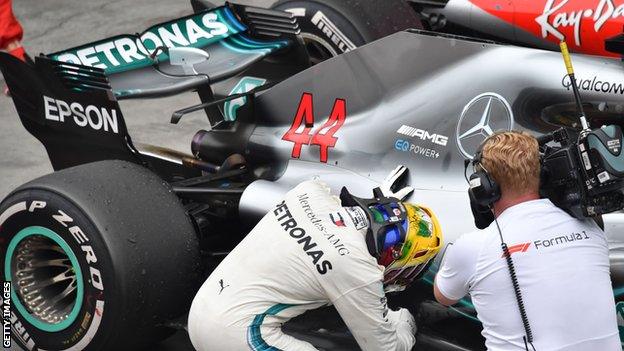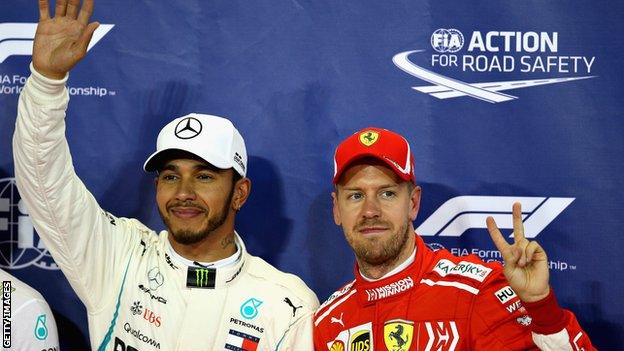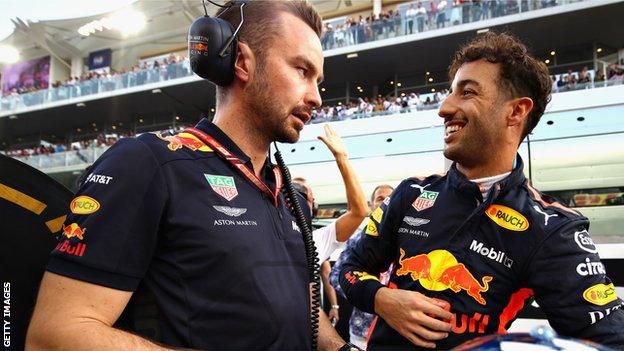Formula 1 in 2019: Lewis Hamilton's sixth title and will Leclerc be better than Vettel?
- Published
- comments

Britain's Lewis Hamilton won his fifth world title in 2018
As the sun sets on 2018, and Lewis Hamilton's glorious march to a fifth world title fades into history, thoughts turn to the new Formula 1 season.
What can be expected of a year in which Hamilton is looking for more success, Ferrari and Sebastian Vettel seek atonement, and a number of new names and faces - and one famous old one - look to make their mark?
Can anyone stop Hamilton and Mercedes?
F1 Breakdown: 'Hamilton just has the best car, doesn't he?'
There's one goal for Hamilton and his Mercedes team in 2019.
For Mercedes, a sixth consecutive championship double would break Ferrari's record of five from 2000-4. For Hamilton, a sixth world title would move him clear of Argentine legend Juan Manuel Fangio and leave him only one short of Michael Schumacher's all-time best.
The German's record of 91 wins could also be attainable - Hamilton is on 73, has at least two more years in F1, and has won an average of 10 a year for the past five seasons.
Hamilton's messaging around Schumacher's records has changed in recent times - over the final weeks of 2018 he went from saying they were "never a target" to "hoping I can at least get close".
After the best season of his career in 2018, Hamilton will start the new season as favourite, the fastest driver in the world, more settled than ever before in the best team on the grid.
Team-mate Valtteri Bottas, meanwhile, is in a very difficult position. Winless in 2018, the Finn needs to up his game. And he knows that if he does not do so, the man who could replace him is already in the team - reserve driver Esteban Ocon.
Mercedes boss Toto Wolff has said Ocon will have a race seat in F1 in 2020, after the Frenchman was forced out of Force India following its takeover by Canadian billionaire Lawrence Stroll and the installation of his son Lance alongside Sergio Perez.
Will that seat be as a replacement for Bottas as Hamilton's team-mate?
Pressure on Vettel and Ferrari

Sebastian Vettel lost the race to win a fifth title and equal the record of Juan Manuel Fangio
Ferrari and lead driver Sebastian Vettel ended last season pushing the line that, in the end, they were not quite strong enough to win the title.
Vettel said they were "still too far away" and team boss Maurizio Arrivabene was talking about a need to develop a "winning habit" and take more one-twos.
The reality is Vettel and Ferrari could - and arguably should - have won the title had they not made so many mistakes, regardless of how good Hamilton's season was. And it's simple enough to prove it by going back through the season and looking at the results they could have had but threw away for various reasons.
Many of those errors came from Vettel, who said he was going to spend the winter looking at himself and working out how to do better in 2019.
If Ferrari design a car that can compete right at the front again, can Vettel and the team raise their game and take the fight to Hamilton and Mercedes throughout the entire season? If not, what will the fall-out be?
What if Leclerc is better then Vettel?
The driver line-up at Ferrari creates an intriguing new plot line. After four years, the cosy relationship between Vettel and Kimi Raikkonen, who knew his place and was not usually quick enough to challenge his team-mate anyway, has gone.
In Raikkonen's place, Ferrari have signed 21-year-old Charles Leclerc, who has all the makings of a very special talent indeed.
How will Leclerc, fresh from a stellar debut season with Sauber, match up with Vettel?
Despite Vettel's difficult 2018, he remains a world-class act, and beating the German will not be easy. But if Leclerc starts to do it, it will raise all sorts of uncomfortable questions at Ferrari.
Assuming they are battling Hamilton for the title, which driver do they back? If it's Leclerc, how would Vettel - their number one for four years and clearly the senior figure - react? And, regardless of how it plays out, how do the team handle the new dynamic?
Can Honda make Red Bull title contenders?
Red Bull have finally ended their difficult relationship with engine partner Renault and joined forces with Honda - and expectations are high.
Red Bull claimed at the end of last season the Honda was already better than the Renault - although Honda F1 technical boss Toyoharu Tanabe demurred and suggested to this writer that the two engines were "comparable".
There are still question marks about Honda's performance and reliability. They used more engines per driver than any other manufacturer last season, even if some of the changes were for tactical reasons in a development year.
Nevertheless, the expectation at Red Bull is the Japanese company can make more progress over the winter and move the team closer to the front.
Team boss Christian Horner says: "We are expecting speed bumps along the way. It is not going to go to a Mercedes-beater in year one, but we're taking a longer-term view on it and we believe the resource, the capability, the desire of Honda is far better suited [to us than Renault]."
Even a modest increase in relative performance from the engine could make a big difference to Red Bull.
They ended the season fully competitive in most of the past four races, so don't rule out them joining the fight with Mercedes and Ferrari for regular race wins.
If they can, the prospects of Max Verstappen and his all-in, bullish approach coming up against Hamilton are mouth-watering.
And, into the bargain, the Dutchman has a feisty new team-mate in Pierre Gasly. If the Frenchman is close to Verstappen on pace, there could be fireworks.
How will Ricciardo get on at Renault?

"Renault? Seriously?" Daniel Ricciardo will be driving for Renault in 2019 - much to the surprise of... everyone, basically
Over the past five years at Red Bull, Daniel Ricciardo has established himself as one of the finest drivers in the sport, arguably the best overtaker - and the funniest guy in the pit lane.
The Australian has taken the momentous decision to leave Red Bull and move to Renault,, external which he calls "the next step, the next leap, the next challenge".
Many have questioned Ricciardo's move from a team that wins races to one regularly lapped by his former employer in 2018.
How will it go? Can he help Renault with their quest to become winners and champions again? Will Renault close at least some of the chasm that separated them as the best of the rest from the top three teams?
How will Ricciardo feel if he is lapped by Gasly in what could have been his car? How will he compare with new team-mate Nico Hulkenberg up in what is the German's first opportunity in years to showcase his talent against a genuine top-liner?
And, off track, can Ricciardo and his zany sense of fun stay central to the narrative? He deserves more than to be a comic sideshow.
Can rising stars help British legends?
Meet Lando Norris - McLaren's new kid on the block
McLaren and Williams have fallen a long way from their halcyon days, when they dominated the sport for much of the 1980s and 1990s.
The two great names had the worst cars on the grid for much of 2018. Both hope the new season will mark the beginnings of a turnaround in fortunes. And both have identified promising young British drivers as part of their revival.
At McLaren, Lando Norris joins Spain's Carlos Sainz, following the departure of the legendary Fernando Alonso, who has left F1 to try to win the Indianapolis 500 and complete motorsport's 'triple crown' of Monaco Grand Prix, Le Mans and Indy.
Norris is only 19, but has excelled on his way up the ladder and McLaren have great hopes for both him and Sainz. Having identified design flaws in their 2018 car, they expect to make a step forward on the track.
Williams, meanwhile, have one of the most fascinating driver line-ups on the grid.
Briton George Russell, who beat Norris to the Formula 2 title in 2018, is thought to have extremely big potential. The 20-year-old is partnered by Robert Kubica, returning after an eight-year absence caused by the horrific rally accident in 2011 that left him with a partially severed right arm.
Kubica, winner of the 2008 Canadian Grand Prix, was one of the sport's most exciting talents. Can the Pole recapture his former level, while driving with a significant disability?
Will new rules improve the racing?
Formula 1 bosses have changed the technical rules for 2019 in an attempt to enable cars to race closer together.
The front wing has been modified in a way that it is hoped will reduce the effect of so-called 'dirty air' on a car behind.
It means a driver trying to overtake should find his car's aerodynamics less badly affected in the wake of a car in front. So he should be able to follow more closely, and overtaking should therefore be a little easier. That's the theory, anyway.
The new wings are wider, but much less complicated - and are also less effective at generating downforce.
The change has come out of research into a wider set of rule changes for 2021.
Technically speaking, the new wing reduces what is known as the 'out-wash effect' - the ability of teams to turn the airflow around the outside of the front tyres, and energise the patterns of flow vortices that are so critical to the ability of modern F1 cars to generate downforce.
But, as teams have begun to research the change, scepticism has grown as to whether it will have any significant effect. Teams say they have clawed back most of, if not all, the lost downforce, and they believe any improvement in the ability to follow will be marginal, if it exists at all.
The fact the tyres are not changing fundamentally further undermines the belief there will be any noticeable change. Their thermal sensitivity has arguably at least as big an effect on the ability of drivers to follow closely and race hard.
The proof is in the pudding, of course. But if the wing change makes little difference, one has to wonder what teams will then say about the likelihood of the 2021 changes working - not that anyone knows what they are yet.
Don't forget the off-track stuff
Talk about rule changes inevitably leads to questions of politics, which look set to be centre stage in 2019.
The teams are in the midst of negotiations with F1's new owner Liberty Media about their contracts for the period after 2020 - when every team's commitment to F1 ends, apart from Renault.
Among the most crucial matters to be agreed is how much prize money each team receives.
F1 wants to make the money split more equitable, reduce the amount of money the big teams receive, and introduce a budget cap. The leading teams are understandably not keen on any cut in income, even if they accept ways have to be found to reduce costs and bring the field closer together.
In theory, F1 could just impose its plans and say take it or leave it. But they don't want to work in that way, not least because the risk is the likes of Mercedes or Ferrari could quit.
With the deadline of the end of 2020 getting ever closer, this promises to be one of the defining aspects of the new year.